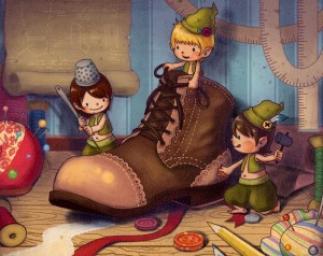The Elves and the Shoemaker
Once upon a time there was an honest shoemaker who was very poor. He worked as hard as he could, and still he could not earn enough to keep himself and his wife. At last there came a day when he had nothing left but one piece of leather, big enough to make one pair of shoes. He cut out the shoes, ready to stitch, and left them on the bench; then he said his prayers and went to bed, trusting that he could finish the shoes the next day and sell them.
Bright and early the next morning, he rose and went to his workbench. There lay a pair of shoes, beautifully made, and the leather was gone! There was no sign of anyone having been there. The shoemaker and his wife did not know what to make of it. But the first customer who came was so pleased with the beautiful shoes that he bought them, and paid so much that the shoemaker was able to buy leather enough for two pairs.
Happily, he cut them out, and then, as it was late, he left the pieces on the bench, ready to sew in the morning. But when morning came, two pairs of shoes lay on the bench, most beautifully made, and no sign of anyone who had been there. It was a puzzle. That day a customer came and bought both pairs, and paid so much for them that the shoemaker bought leather for four pairs, with the money.
Once more he cut out the shoes and left them on the bench. And in the morning all four pairs were made.
It went on like this until the shoemaker and his wife were prosperous people. But they could not be satisfied to have so much done for them and not know to whom they should be grateful. So one night, after the shoemaker had left the pieces of leather on the bench, he and his wife hid themselves behind a curtain, and left a light in the room.
Just as the clock struck twelve, the door opened softly and two tiny elves came dancing into the room, hopped on to the bench, and began to put the pieces together. They were quiet, but they had wee little scissors and hammers and thread. Tap! Tap! went the little hammers; stitch, stitch, went the thread, and the little elves were hard at work. No one ever worked so fast as they. In almost no time all the shoes were stitched and finished. Then the little creatures whisked away out of the window.
The shoemaker and his wife looked at each other and said, "How can we thank the little elves who have made us happy and prosperous?"
"I should like to make them some pretty clothes," said the wife.
"I will make the shoes if you will make the coats," said her husband.
That very day they commenced their task. The wife cut out two tiny, tiny coats of green, two little pairs of trousers, of white, two bits of caps, bright red, and her husband made two little pairs of shoes with long, pointed toes. They made the clothes as dainty as could be, with nice little stitches and pretty buttons. By Christmas time, they were finished.
On Christmas Eve, the shoemaker cleaned his bench, and on it, instead of leather, he laid the two sets of clothes. Then he and his wife hid away as before, to watch.
Promptly at midnight, the little elves came in. They hopped upon the bench; but when they saw the little clothes there, they laughed and danced for joy. Each one caught up his little coat and things and began to put them on. They were so happy. Then, when the clock struck two, they left smiling.
They never came back any more, but from that day they gave the shoemaker and his wife good luck, so that they never needed any more help.
